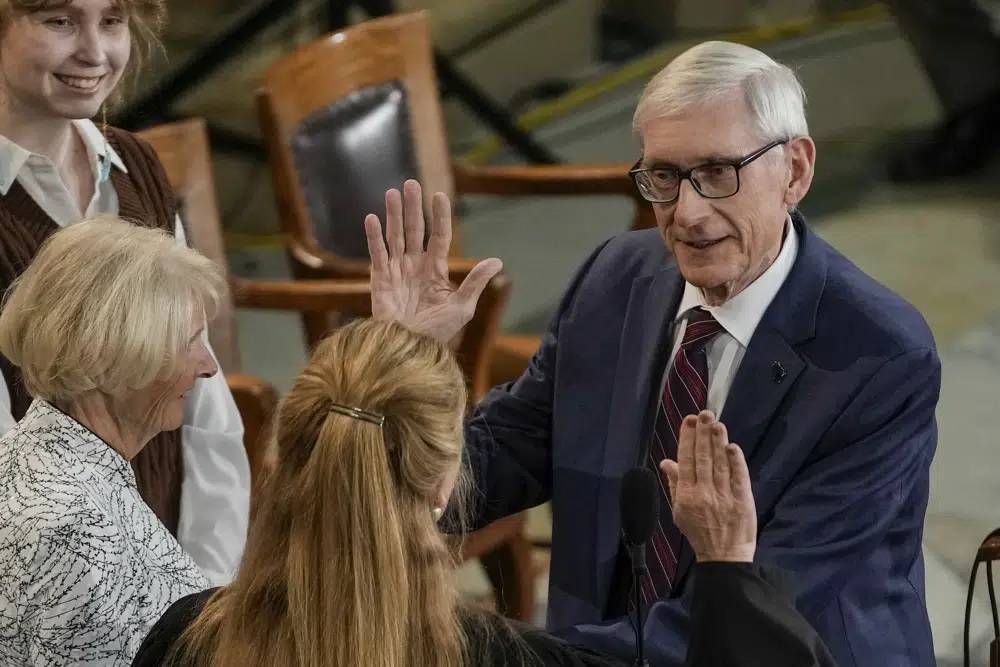Politics
Wisconsin Gov. Evers signs shared-revenue bill designed to better fund local governments, save Milwaukee from bankruptcy

MADISON, Wis. (AP) — Wisconsin’s Democratic Gov. Tony Evers called it a “historic day” before he signed a bipartisan bill on Tuesday that sends 36% more money overall local governments, funds K-12 public schools and increases voucher school money, as well as saves Milwaukee from bankruptcy.
Evers signed the bill surrounded by a bipartisan group of state lawmakers, Milwaukee leaders and local officials in Wausau. Local governments have been clamoring for more state aid following years of cuts or stagnant funding that have forced cuts to essential services like police and fire protection.
“For far too long, our local communities have been forced to do more with less,” Evers said. “And we’ve seen the consequence of that play out in communities across Wisconsin.”
He said communities have been “forced to make impossible decisions about what essential services to fund.”
While the focus of the new law is sending more money to Wisconsin’s local governments, it also includes a wide array of other provisions.
Those include cutting aid to communities that reduce the number of police officers and firefighters and banning public health officials from ordering businesses closed for more than 30 days without approval from a local governing board, which could extend closures for only an additional 30 days.
The law also forbids local communities from putting advisory referenda questions on the ballot, except those related to certain projects that would be funded with property tax money. The bill would not allow questions on hot-button issues like whether voters support abortion rights, accept Medicaid expansion or legalize marijuana, which many communities across the state have put forward in recent years.
The law also targets diversity, equity and inclusion efforts.
It prevents Milwaukee from using tax money for “funding any position for which the principal duties consist of promoting individuals or groups on the basis of their race, color, ancestry, national origin or sexual orientation.”
The law also says that no local government “may discriminate against, or grant preferential treatment on the basis of, race, color, ancestry, national origin, or sexual orientation in making employment decisions.”
It further requires Milwaukee Public Schools to return at least 25 police officers, known as school resource officers, to its schools by Jan. 1.
Evers also signed the measure increasing funding for schools, which some Democrats objected to because it also increases funding to private schools that accept voucher students. Evers, a former state education secretary, heralded the additional $1 billion in money for K-12 schools, including more for special education, literacy programming and mental health services..
The roughly $1 billion in aid to local governments — known as shared revenue — would be paid for by tapping 20% of the state’s 5-cent sales tax. Aid would then grow along with sales tax revenue.
The measure increases current aid by about $250 million statewide. The shared revenue program to fund local governments, created in 1911, has remained nearly unchanged for almost 30 years, despite overall growth in tax revenues.
Shared revenue for counties and municipalities was cut in 2004, 2010 and 2012 and since then has been relatively flat. The Legislature passed the bill on a bipartisan vote last week.
Milwaukee’s leaders had warned of catastrophic cuts if the bill was not enacted. Milwaukee is struggling with an underfunded pension system and not enough money to maintain essential police, fire and emergency services.
State Sen. LaTonya Johnson, of Milwaukee, said at the bill signing ceremony that the city was “on the verge of insolvency” that would have required laying off hundreds of police and firefighters, among others. The additional funding provides a lifeline, she said.
“It is our city’s opportunity to start over,” Johnson said.
The new law also allows the Milwaukee Common Council and Milwaukee County Board to vote on raising local sales taxes, a power they did not have.
Some Republicans in the Legislature had wanted to require a vote of the people before those local sales taxes could be raised. But Milwaukee leaders, Democrats and some Republicans argued the need for more funding was too critical to leave to a referendum vote that could fail.
With Evers’ signing the bill, the focus now shifts to those Milwaukee governing boards to see if they will vote to approve the increase.

